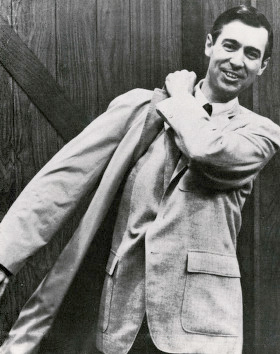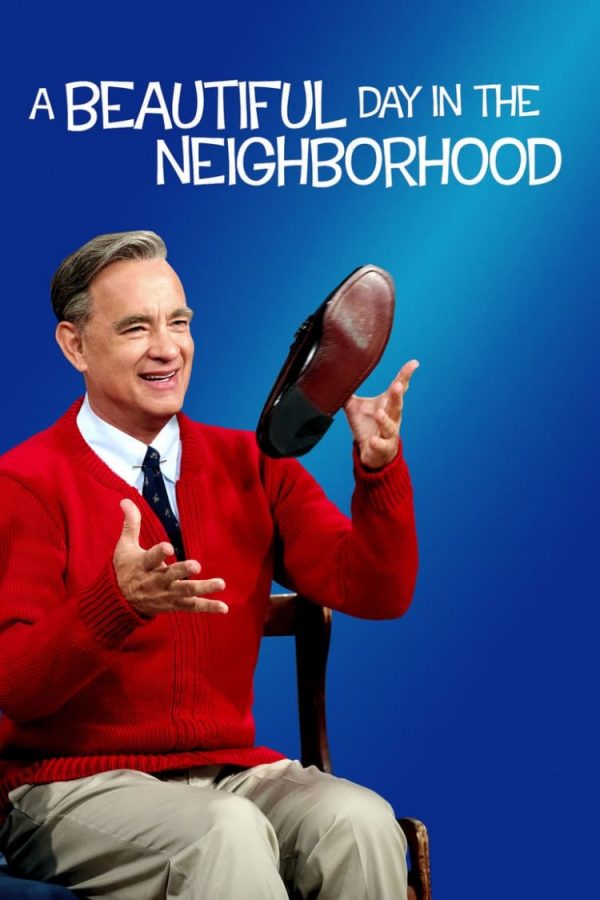A Beautiful Day in the Neighborhood
The recently released movie has brought about a revival of the ideas of Mister Rogers.
Tom Hanks has recently earned an Oscar nomination for his depiction of Rogers in the film.
Riding the wave of popularity from the 2018 documentary, “Won’t You Be My Neighbor?”, Sony Pictures has created a tribute to the leader of the classic children’s television show that will warm the hearts of many. Revolving around a heart-hardened journalist’s relations with Mister Rogers and the emotions that he is able to develop based on his conversations with him, A Beautiful Day in the Neighborhood has garnered critical acclaim as of late.
Lloyd Vogel, based on real-life journalist Tom Junod, is assigned to profile Fred Rogers by Esquire magazine, where he has written several successful “exposé” stories. Initially, Vogel is mad that he has been given the job of a “fluff” article, but as his relations with Rogers grow in-depth, he begins to see something in himself – thanks to Mister Rogers – that he didn’t know was there before.
Vogel’s journey of self-discovery is especially poignant due to the tense relationship he had with his father based on past differences. Epitomizing the idea of the ignorant dad, there are some creative liberties taken in regards to the exchanges with Vogel’s father, which is the reason that Junod requested a pseudonym to be used. The aggressions between them are greatly exaggerated, including the damaging fistfight that he has with him at a wedding near the beginning of the film.
Flying to Pittsburgh for the first time (which is represented by a whimsical hand-made model reminiscent of the Neighborhood show’s title sequence), Vogel has a short talk with Rogers where he asks about Vogel’s wound, which leads to him becoming frustrated with how the conversation is going – he’s supposed to be working on a magazine article. However, it is apparent to the viewer that Vogel, even in his confusion, has gained something valuable from his brief conversation with Mister Rogers.
On his subsequent returns to Pittsburgh, Vogel becomes more open to Rogers’ calm demeanor and speaking style. One of the most powerful moments of the film occurs when Hanks asks for a minute of silence to “think about the people who have helped make you who you are,” while staring directly at the camera and the viewers. Also during this time, there are some not-so-subtle cameos of Rogers’ wife and the actor of Mister McFeely – both of whom are still alive.
Vogel’s final story – originally a short column – turns into an expansive cover story on the importance and philosophy of heroes. Without giving away the ending, Vogel undergoes several life-changing events that are made more tolerable because of what he has learned from Fred Rogers.
Mister Rogers is exactly as he is portrayed and thought of in the hearts of many, and although this will be a surprise to many people, many people have backed up the fact that the Fred Rogers of daily life was exactly as he acted in his show. There was no divide between the “character” of Mister Rogers and the man himself, and Vogel finds it hard to accept that fact. Rogers is obviously someone very different from the rest of the people he has met in his life, and at first, Vogel finds him extremely frustrating. However, the fact that Vogel uses what Rogers says to him as a way to further develop himself certainly speaks to his own character.
Some were likely wary of Tom Hanks playing the part of Mister Rogers, and many might not be able to see past the star of Forrest Gump and Toy Story to the character he is supposed to be portraying. The sound of his voice doesn’t exactly sound like Rogers’, but it still gives an air of resemblance that doesn’t feel staged. All in all, A Beautiful Day in the Neighborhood is a lovely film that has a sense of childhood wonder while remaining focused on an adult audience.
The widespread popularity – and current resurgence – of the popularity of Fred Rogers can largely be contributed to the wide-reaching nature of his television show; without it, his demeanor wouldn’t have been nearly as well known. Sadly, there are likely many people in the world like Fred Rogers who will never be known solely because they have no effective way to communicate with the world.

Fred Rogers in the late 1960s
NAI students are actually among the last children who viewed the original Neighborhood television as small kids. Daily airings stopped in 2008, which makes the child born in 2003 or 2004 to be among the last to have experienced the show at the prime age. The Daniel Tiger’s Neighborhood animated spin-off is a quality preschool show, but it will never match the magic of the real Mister Rogers. However, you will still be able to glean much meaning from the new movie, even if you didn’t often watch the show as a child.
Given that Fred Rogers was the lead on a children’s television show, many people overlook the application that his teachings can have on adults. The basis of many of Fred Rogers’ ideals is that we were once children, and we shouldn’t lose sight of that fact. And the teachings imparted in the show itself shouldn’t be passed over either. People should not look at the movie as “for kids” just because it revolves around a children’s TV host.
Fred Rogers was a revolutionary – a quiet and calm revolutionary, yes, but definitely a revolutionary.
Mr. Rogers died in 2003, and what has happened in the world since his death means that, interestingly, much more is expected of him by the public today. The Atlantic attributed Rogers’ reputation remaining as strong presently as it was when he was alive due to the “hunger for goodness” that humanity subconsciously shares. Mister Rogers really did like us all exactly the way we were, which is a standout in a world of celebrities with demeaning histories. As a result, during the making of the movie, the filmmakers had to capture Fred Rogers as he really and truly was. And that wasn’t something that was hard to do.
So in a sense, the true inspiration from Mister Rogers comes from the knowledge that such a truly whole person once existed in the world; it’s that idea of such a person that hopefully gives us the motivation to carry out similar actions in our lives. So, when a person has such a positive influence on the society around him, we can certainly say that he or she has truly accomplished something worthwhile. If any person fulfills that definition, it is surely Mister Rogers’ legacy at work.

Andrew McLaughlin is a ninth-grader at North Allegheny Intermediate. He formerly was the editor on the student newspaper at Carson Middle School and enjoys...



